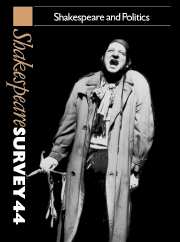Book contents
- Frontmatter
- Shakespeare and Politics
- Language, Politics, and Poverty in Shakespearian Drama
- Some Versions of Coup d’état, Rebellion and Revolution
- Woman, Language, and History in The Rape of Lucrece
- Love in Venice
- Two Kingdoms for Half-a-Crown
- ‘Fashion it thus’: Julius Caesar and the Politics of Theatrical Representation
- ’Demystifying the Mystery of State’: King Lear and the World Upside Down
- Tragedy, King Lear, and the Politics of the Heart
- The Politics of Shakespeare Production
- Shakespeare in the Trenches
- Shakespeare’s Earliest Editor, Ralph Crane
- Shakespeare’s Falconry
- Telling the Story of Shakespeare’s Playhouse World
- Shakespeare Performances in England, 1989–90
- Professional Shakespeare Productions in the British Isles January-December 1989
- Critical Studies
- Shakespeare’s Life, Times, and Stage
- Editions and Textual Studies
- Books Received
- Index
Shakespeare in the Trenches
Published online by Cambridge University Press: 28 March 2007
- Frontmatter
- Shakespeare and Politics
- Language, Politics, and Poverty in Shakespearian Drama
- Some Versions of Coup d’état, Rebellion and Revolution
- Woman, Language, and History in The Rape of Lucrece
- Love in Venice
- Two Kingdoms for Half-a-Crown
- ‘Fashion it thus’: Julius Caesar and the Politics of Theatrical Representation
- ’Demystifying the Mystery of State’: King Lear and the World Upside Down
- Tragedy, King Lear, and the Politics of the Heart
- The Politics of Shakespeare Production
- Shakespeare in the Trenches
- Shakespeare’s Earliest Editor, Ralph Crane
- Shakespeare’s Falconry
- Telling the Story of Shakespeare’s Playhouse World
- Shakespeare Performances in England, 1989–90
- Professional Shakespeare Productions in the British Isles January-December 1989
- Critical Studies
- Shakespeare’s Life, Times, and Stage
- Editions and Textual Studies
- Books Received
- Index
Summary
In April 1916 the tercentenary of Shakespeare's death was celebrated both in England and Germany, although the two countries had been at war for almost two years. This may just sound like an intriguing story, but it is also of considerable critical interest, because it illustrates how Shakespeare's international reputation survived under pressure, how conflicting views of him were defined by the political situation, and how these views, in turn, shaped the meaning of Shakespeare's texts, and affected the history of literary studies after the war.
In other words, in tracing these developments here Shakespeare will be considered as a public symbol, as myth. But this will be done in a comparative perspective, which may help to remove the national limitations characteristic of most studies in this area.
In England a committee, with the Prime Minister as its honorary president, had prepared elaborate ceremonies. They could not really include 23 April, the day of Shakespeare's birth and death (and, significantly for many, St George's Day), because, in 1916, it coincided with Easter Sunday. Officially suggesting a parallel between Christ and Shakespeare would have meant taking things too far. Therefore the celebrations concentrated on the first week of May. On four days great institutions did homage to Shakespeare, on Sunday the Church, on Monday politics, on Tuesday the arts, on Wednesday education.
- Type
- Chapter
- Information
- Shakespeare Survey , pp. 105 - 112Publisher: Cambridge University PressPrint publication year: 1991
- 11
- Cited by

